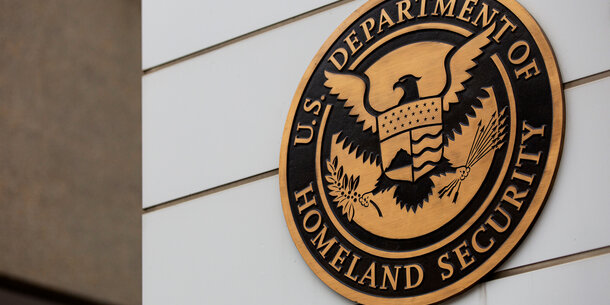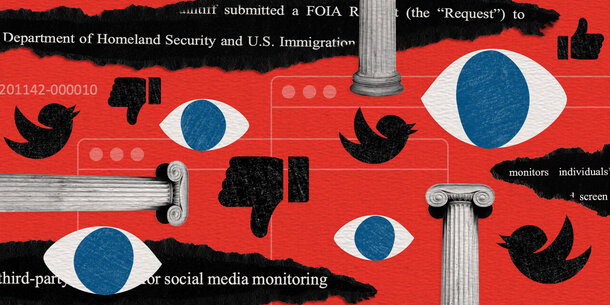Our campaign related to the Department of Homeland Security (DHS) explores how the department has executed its overbroad mandate without adequate safeguards or effective oversight. Many DHS operations are often obscured by a veil of secrecy, making it impossible for the American public to assess DHS activities done under the guise of protecting national security. As part of our work to understand and explain DHS’s interrelated security and intelligence programs, we submitted four requests under the Freedom of Information Act (FOIA) on January 27, 2023, each focusing on DHS efforts or initiatives about which little is known.
- Expanded Watchlisting. The first FOIA request, which we also submitted to the Federal Bureau of Investigation (FBI), seeks information about recent efforts to expand troubling watchlisting systems beyond terrorism to transnational organized crime.
- Legal Justifications. The second seeks DHS attorney memoranda that explain DHS’s interpretation of its expansive intelligence authorities and justify its broad intelligence capabilities. While Americans feel the effects of these programs when traveling, protesting, or engaging in religious expression, little is understood about their legal justification.
- Research Security. Building on advocacy successes to end the Department of Justice’s discriminatory China Initiative, the third request seeks information about DHS intelligence, screening, and border efforts to scrutinize foreign-born researchers, their American connections, and universities in the name of protecting research.
- Electronic Media Exploitation. The fourth request seeks information about programs within the DHS Office of Intelligence and Analysis (I&A) to extract and analyze documents and media from Americans’ cell phones and laptops, and to conduct “network analysis” of Americans and others in or entering the United States.
See the Brennan Center’s FOIA requests below.
Watchlist Expansion
- Read the FOIA request here.
Overview: For years, the U.S. government has maintained terrorism watchlists, such as the FBI’s Terrorist Screening Database, which have proved discriminatory and harmful to Americans’ rights. Recently the government has begun quietly expanding this watchlisting regime. The FBI’s Terrorist Screening Center appears to have initiated a government-wide transnational organized crime (TOC) watchlist pilot program. DHS participates and has expanded its Watchlist Service to include this new type of information. TOC is inconsistently defined, potentially capturing a wide swath of people, and we fear these efforts could evolve to harm a significantly broader set of Americans, immigrants, and travelers than current watchlists. The Brennan Center seeks records from DHS and the FBI about new watchlisting efforts, including operational and policy documents, legal analyses, and intelligence reports produced as part of the program.
Updates: On January 27, 2023, the Brennan Center submitted its FOIA requests to DHS and the FBI, and the FBI issued an automated response acknowledging that it had received the request.
Office of the General Counsel Intelligence Memoranda
- Read the FOIA request here.
Overview: The DHS Office of Intelligence and Analysis (I&A) is one of the only elements of the U.S. Intelligence Community with a directly domestic focus. Despite the potential risks, I&A also has broad discretion across a wide set of ill-defined missions, often with weak safeguards against abuse. Unsurprisingly, I&A has come under heavy scrutiny recently, especially regarding its heavy-handed response to 2020 civil rights protests in Portland, Oregon, which included surveillance of journalists and protestors in support of a hyperbolic politicized narrative. The public has a right to understand DHS’s asserted legal basis for the department’s vast intelligence operations. In our FOIA request, we seek legal memoranda from the DHS Office of the General Counsel that support a range of intelligence activities.
Updates: On January 27, 2023, the Brennan Center submitted its FOIA request.
Research Security Initiatives
- Read the FOIA request here.
Overview: The U.S. government has targeted people whom it claims have infiltrated our society to steal American intellectual property and scientific knowledge on behalf of a foreign government. While the Department of Justice’s discriminatory and ill-conceived “China Initiative” drew heavy public outcry that led to its shuttering, DHS appears to have developed at least five potentially related efforts to root out “foreign threats” to American research via the department’s immigration, screening, and intelligence initiatives. Through our FOIA request, we seek operational, legal, and policy records to understand each of these programs and help inform the public of the government’s actions on its behalf.
Updates: On January 27, 2023, the Brennan Center submitted its FOIA request.
I&A Document and Media Exploitation Efforts
- Read the FOIA request here.
Overview: Several DHS components engage in the process of extracting and analyzing information from cell phones and laptops seized during law enforcement, border security, and intelligence activities. For instance, CBP seizes people’s electronic devices at the border, extracts full copies of their contents, and uploads them to its analytic databases. Though CBP’s activities have been the subject of wide reporting, little is known about I&A’s apparent efforts conducted by entities called the DHS Joint Analysis Group (D-JAG) or the I&A Homeland Identities, Targeting, and Exploitation Center (HITEC). Through our FOIA request, we seek operational, legal, and policy records about I&A’s participation in programs to exploit Americans’ electronic devices.
Updates: On January 27, 2023, the Brennan Center submitted its FOIA request.





